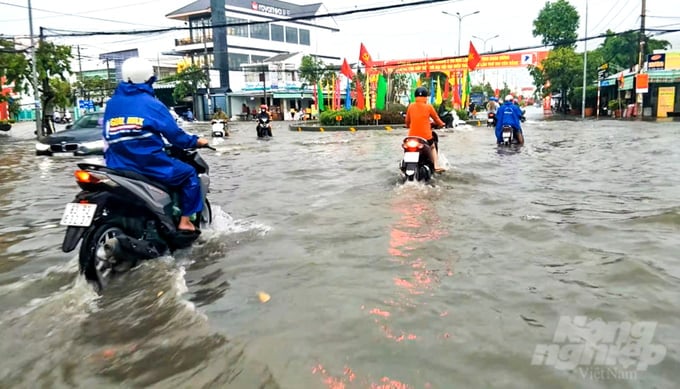November 20, 2025 | 10:24 GMT +7
November 20, 2025 | 10:24 GMT +7
Hotline: 0913.378.918
November 20, 2025 | 10:24 GMT +7
Hotline: 0913.378.918
Numerous directives and designs have been introduced over the past few years to enhance climate resilience within the Mekong Delta region, with a focus on the persisting issue of urban flooding. This challenge was raised by Mr. Pham Ngoc Mau, Deputy Director of the International Cooperation Department under the Ministry of Agriculture and Rural Development during the workshop on the Mekong Delta Climate Resilience Project (MCRP) Phase II, held on November 1 in Can Tho city.
Mr. Mau assessed that the impact of climate change on the Mekong Delta has been distinctly evident. As a result, local governments within the region need to provide necessary measures, management approaches, and individual responsibilities through the MCRP. This effort aims to contribute to the improvement of land, water, and brackish mangrove forest management in the Mekong Delta region, thereby facilitating its adaptation to climate change.

Mr. Pham Ngoc Mau, Deputy Director of the International Cooperation Department under the Ministry of Agriculture and Rural Development, acknowledged that the issue of urban flooding lacks fundamental solutions. Photo: Kim Anh
As a representative of the Project owner of MCRP, Mr. Mau expects that the project will be implemented in a practical and beneficial manner, wtih regards to the current state of disaster prevention and control in the Mekong Delta region.
Soc Trang city in Soc Trang province is an urban area within the Mekong Delta at high risk of flooding, with flooding levels ranging from 10 to 20%. Accordingly, the Soc Trang Provincial People's Committee has invested extensively in upgrading, renovating, and expanding the urban drainage system. However, these efforts have failed to meet ongoing demands.
According to Mr. Nguyen Hieu Nghia, Head of Urban Development and Technical Infrastructure under Soc Trang province's Department of Construction, the city's drainage system was established before 1975 and spans approximately 100 kilometers. The rapid process of urbanization has overloaded this system, causing a failure to ensure adequate water flow.
Heavy rainfalls in early October 2023 has submerged numerous main roads in Soc Trang city, causing partial flooding and impacting the mobility and transportation of goods for the residents in the central area.

The insufficient drainage capacity in Soc Trang city has resulted in localized urban flooding, which is further accentuated by heavy rainfall in combination with high tides. As a result, the mobility and daily lives of local residents were disrupted. Photo: Kim Anh.
Notably, whereas floodings may last three to six hours in the past, they can now presist for up to twelve hours. Mr. Nghia attributed the prolonged flood durations to the inadequate drainage capacity as well as the outdated design standards of the drainage system, which are no longer suitable for the current heavy rainfall and high tides.
According to the Soc Trang city General Planning Project approved in 2018, the city has studied solutions to adapt to climate change, including both structural and non-structural solutions. These solutions combine technical and landscape aspects aimed at developing green and smart urban areas. Six multi-purpose reservoirs were also planned to serve as water retention areas during heavy rainfalls and high tides.
Mr. Christoph Klinnert, Chief Advisor of the MCRP, emphasized that urban flooding and climate change are highly complex issues. MCRP has implemented various solutions for building urban infrastructure in response to climate change within the Mekong Delta region. This involves the simultaneous implementation of various systems such as permeable sidewalks, water storage, green roof systems, among many others. Accordingly, these solutions help urban areas adapt to the impacts of climate change and reduce the risk of flooding.

Mr. Christoph Klinnert, Chief Advisor of the MCRP Project, assessed that urban flooding is a highly complex issue, necessitating cohesive solutions to enhance urban resilience against the impacts of climate change. Photo: Kim Anh.
Furthermore, the MCRP Project also supports the integration of technical criteria into the urban drainage system planning.
"When these solutions are incorporated into the legal framework, the technical standards will have stronger impact, which will benefit not only the pilot provinces but also the entire Mekong Delta region," shared Mr. Christoph Klinnert.
Ca Mau province has recently invested in two temporary steel-gated structures. Accordingly, these structures utilize modern technologies to protect 120 hectares of agricultural land against saltwater intrusion, thereby ensuring livelihoods for over 80 local households. Additionally, 21 automatic water monitoring stations have been installed in the provinces of Soc Trang, Bac Lieu, and Ca Mau, providing real-time water data for agricultural production.
MCRP has been implemented by GIZ Vietnam in collaboration with Disaster and Dyke Management Authority across 13 provinces and cities within the Mekong Delta region since 2019.
The project, sponsored by the Swiss and German governments, aims to support management agencies in enhancing their climate change adaptation capacities within the Mekong Delta region through the establishment of a regulatory framework, thereby fostering regional development partnerships, and applying innovative technology solutions in both rural and urban areas.
Translated by Nguyen Hai Long

(VAN) This is the study conducted by IRRI and Can Tho University on the rice straw value chain in Mekong Delta showing an economic potential of more than 6.6 trillion VND/year.

(VAN) By participating in cooperative economics, many farmers in Tay Ninh have overcome hardship, mastered clean dragon fruit cultivation techniques.

(VAN) The crossbreeding program in the former Binh Dinh province (now part of Gia Lai) has shown signs of decline, and urgent measures are needed to revive it and sustain past achievements.

(VAN) The agricultural sector agreed on a roadmap to pilot the MRV protocol and expand low-emission rice production from the 2025-2026 winter-spring crop.

(VAN) Agricultural extension officers in Quang Ninh do more than transmit knowledge; they have become a steadfast support system for farmers on the path to sustainable agricultural development.

(VAN) The development of a high-quality beef cattle herd has brought major benefits to livestock farmers, creating jobs and enabling better use of agricultural by-products.

(VAN) In the eastern region of Gia Lai, crossbred cattle now account for 93%, forming a high-quality beef herd and establishing a recognized brand, the result of 35 years of persistent effort.